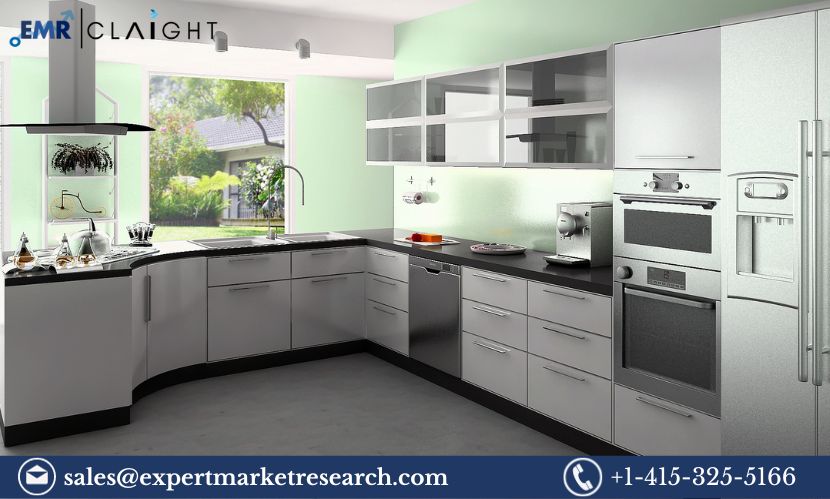Modular Kitchen Market Overview
The global modular kitchen market has been on a remarkable growth trajectory in recent years, driven by changing consumer lifestyles, urbanization, and the increasing emphasis on kitchen aesthetics and functionality. According to a report by Expert Market Research, the global modular kitchen market size reached a value of USD 33.38 billion in 2023. With a projected compound annual growth rate (CAGR) of 5.3% from 2024 to 2032, the market is poised to surge to a value of USD 53.12 billion by 2032.
Modular kitchens, characterized by their pre-fabricated and customizable design, have gained immense popularity across the globe. These kitchens are not just spaces for cooking but are now integral parts of modern homes, serving as hubs for culinary creativity, social interaction, and even workstations. This transformation of the kitchen space has propelled the demand for modular kitchen solutions.
Get a Free Sample Report with Table of Contents@
https://www.expertmarketresearch.com/reports/modular-kitchen-market/requestsample
Key Market Drivers
Several factors contribute to the rapid growth of the global modular kitchen market:
- Urbanization: The ongoing urbanization trend has led to smaller living spaces, increasing the demand for compact and efficient kitchen solutions. Modular kitchens are well-suited to maximize space utilization in urban homes and apartments.
- Changing Lifestyles: Modern lifestyles often involve busy schedules, making modular kitchens attractive due to their convenience and time-saving features. They are equipped with the latest appliances, such as built-in ovens, dishwashers, and smart technology, streamlining cooking processes.
- Customization: Consumers increasingly seek personalized kitchen designs that reflect their tastes and preferences. Modular kitchens offer a wide range of customization options, from color schemes to storage solutions, allowing homeowners to create their dream kitchen.
- Rising Disposable Income: A growing middle-class population, particularly in emerging economies, has resulted in increased disposable income. As a result, consumers are willing to invest in home improvements, including kitchen renovations featuring modular designs.
- Innovation: Ongoing innovation in materials and technologies has led to the development of sustainable, durable, and aesthetically pleasing modular kitchen components. This has boosted the appeal of modular kitchens.
Read Full Report with Table of Contents@
https://www.expertmarketresearch.com/reports/modular-kitchen-market
Modular Kitchen Market Segmentation
The market can be divided based on product, design, material used, distribution channel, and region.
Market Breakup by Product
- Floor Cabinet
- Wall Cabinet
- Tall Storage
Market Breakup by Design
- L-Shape
- U-Shape
- Parallel
- Straight
- Island Kitchen
- Peninsula
Market Breakup by Material Used
- Lacquer Wood
- High Pressure Laminates
- Wood Veneers
- Melamine
- Metal
- Others
Market Breakup by Distribution Channel
- Online
- Offline
Market Breakup by Region
- North America
- Europe
- Asia Pacific
- Latin America
- Middle East and Africa
Competitive Landscape
The EMR report looks into the market shares, plant turnarounds, capacities, investments, and acquisitions and mergers, among other major developments, of the global modular kitchen companies. Some of the major key players explored in the report by Expert Market Research are as follows:
- Inter IKEA Systems B.V.
- Hettich Holding GmbH & Co. oHG
- Boston Cabinets, Inc.
- Lineadecor
- Pedini SpA
- Arclinea Arredamenti S.p.A
- Nobilia GB Ltd.
- Bulthaup GmbH
- eggersmann küchen GmbH & Co. KG
- Hettich India Pvt Ltd.
- SieMatic Möbelwerke GmbH & Co. KG
- Others
Modular Kitchen Market Challenges
While the modular kitchen market presents substantial growth opportunities, it also faces challenges:
- High Initial Costs: Modular kitchens can be costlier upfront compared to conventional kitchen setups. This can deter budget-conscious consumers.
- Skilled Labor: Installation of modular kitchens requires skilled labor, and a shortage of trained professionals can lead to delays and increased costs.
- Maintenance: High-end appliances and materials used in modular kitchens may require specialized maintenance, which can add to the long-term ownership costs.
- Cultural Preferences: In some regions, traditional kitchen designs hold cultural significance, and consumers may be reluctant to adopt modular kitchens.
Modular Kitchen Market Trends
To remain competitive, modular kitchen manufacturers are embracing several trends:
- Smart Kitchens: Integration of smart technology, including voice-activated appliances and connected kitchen systems, enhances the user experience and adds a futuristic touch.
- Sustainability: Eco-friendly materials and energy-efficient appliances are becoming more prevalent in modular kitchen designs as environmental consciousness grows.
- Open Concept Kitchens: Open layouts that seamlessly connect the kitchen with other living spaces are gaining popularity, emphasizing the social aspect of cooking and entertaining.
- Luxury Segment: High-end modular kitchens with premium finishes and features cater to affluent consumers seeking a luxurious culinary experience.
- Online Sales: The e-commerce boom has extended to modular kitchens, with an increasing number of consumers purchasing kitchen components online.
Media Contact:
Company Name: Claight Corporation
Contact Person: George buttler, Corporate Sales Specialist – U.S.A.
Email: sales@expertmarketresearch.com
Toll Free Number: +1-415-325-5166 | +44-702-402-5790
Address: 30 North Gould Street, Sheridan, WY 82801, USA
Website: https://www.expertmarketresearch.com

